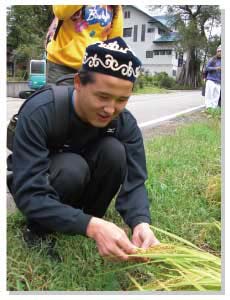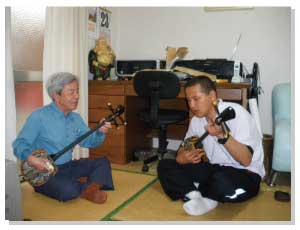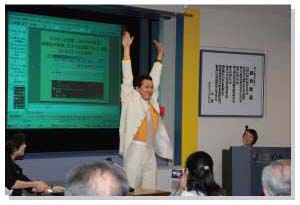- HOME
- Alumni News
- Kenzhegul Seitzhan (10th trainee)
- Kenzhe's Final Report
Kenzhe's Final Report
The new Kenzhegul came into the world!
The Duskin training was my dream.
When I was studying at a university, I saw that students with visual impairments were facing a lot of problems, at university and in society. I wanted to participate in the Duskin leadership training program in order to solve those problems. But before coming to Japan, I had never been abroad, I could not speak much English, nor did Japanese, and I was quite worried about how to communicate with others, how to study Japanese, and how to live.

Coming to Japan
There were both fun things and worries after I arrived in Japan. At the beginning it was very difficult to talk to the other trainees and everyone else. The person who helped me out, was Seinep, one of the trainees. She helped me plenty in Russian when we studied Japanese or during the training programs. She became a sister of mine, a sister whom I met in Japan.
The other hard thing was using the Japanese computer. This time, Janki helped me.
The other trainees also helped me with a lot of things. The seven of us are now really good friends, we are like a family.
When we studied Japanese, the teachers used examples to help us understand better when we got stuck. They taught Japanese like a game. The Japanese language was very hard but the class was a lot of fun. Also, thanks to the Braille teachers, I managed to master Japanese Braille. I would like to say my most sincere words of thanks to all of the Japanese teachers.
In Japan, I was surprised to see how fast the Shinkansen and other trains were. It was also stunning to see how the station staff helped to guide us. They also helped me when I went to many places during my individual training. I thought it was wonderful. In Kazakhstan, we have yet to witness such services.
Home Stay
The father and mother of my home stay host family were very warm, kind people. I had a lot of wonderful Japanese food they cooked for me. They explained to me in detail what the foods were, they also took me to visit the places where the Ainu people lived, and they also taught me a lot about the culture and history of Japan which in turn improved my Japanese. We also spent a relaxing time together dancing and going to karaoke, so I was no longer worried about the individual training. My Japanese family is a wonderful family. Thank you father, thank you mother.
Individual training
1. Mainstream Association
The destination I wanted to visit most for my individual training was Mainstream Association, because I had heard about their TRY from a friend before coming to Japan. TRY is a movement that started in Japan; the first time, a person with a disability walked from Osaka to Tokyo with a friend. Now, a lot of people with disabilities from different countries get together and walk for a week to two in town, to appeal to people about people with disabilities and to convey the importance of having a barrier-free environment. People in town, after seeing the people with disabilities, start thinking more about them. TRY is a movement to change society and I had heart that it was extremely meaningful. It is not just about serious activities, but also a lot of fun events like having dinner or singing together. As there are a lot of people with different disabilities, everyone gets to understand more about others’ disabilities. After I learned about the purposes and concepts of TRY, I strongly felt that I wanted to do the same in Kazakhstan.
The other thing I was happy to have learned, was independent living of people with disabilities. The idea of independent living was totally different from what I had in mind. I had thought that independent living was all about working extremely hard to do everything by oneself, but I realized that I was wrong. I came to understand that one could consider the arms, legs, and eyes of the helper as one’s own, make choices of one’s own, and to live alone, happily.
I also learned that having fun was as important as studying. When I went to a karaoke with a friend with cerebral palsy, the friend could not pronounce the words correctly but was singing very happily and enjoying the moment. I thought it wonderful. Mr Shimoji said it was more important to enjoy singing, than to sing correctly.
I became friends with everyone from Mainstream Association. We went out to do things together and had dinner together. I will never forget them.
2. Human Care Association
I enjoyed the training at Human Care Association, to finalize the learning about independent living. I thought that the test about independent living and peer counseling were great ways to remember and revise what had been learned. It was a wonderful experience.
3. Japan National Assembly of Disabled People’s International (DPI-Japan)
At DPI-Japan, I learned about the rights and welfare systems for people with disabilities. Everyone at DPI-Japan was working together for these issues. There are not such international organizations in Kazakhstan yet. I realized, through this training, that it was important to work in collaboration with other organizations, of people with different disabilities. I also realized that it was very important to meet people in person and talk face to face. We visited companies and newspaper publishers to raise funds and talked to people. These visits were good, as the people at these companies were able to see activities by people with disabilities with their own eyes.
4. Supporting people with visual impairments
My individual training started at Slash-Computer Class for Persons with Disabilities. They taught me how to use a computer and I was able to create a webpage.
I also visited Social Welfare Juridical Person Light Friend Association. At their workshop, many people with various disabilities were working together. They were also making Braille handouts and vocal recordings for people with disabilities. It was a good learning experience.
At Okinawa Welfare Association for the Visually Impaired, I visited places where people with visual impairments were engaged in a variety of activities, such as working on computers, playing the Shamisen (traditional Japanese lute), and participating in sport lessons. I also learned a bit of Okinawan dances.
I am a teacher of history and law in Kazakhstan. It is compulsory for history teachers to memorize maps, but as I could not see, I learned the maps in words. At Nippon Lighthouse Welfare Center for The Blind, I touched a Braille globe and understood the location and shape of Kazakhstan for the first time in my life. It was wonderful. I also learned, at Nippon Lighthouse, about guide dogs. It was great fun to walk with a guide dog. I think guide dogs are important for the life of people with visual impairments.

5. Sport for people with disabilities
The most stunning thing for me was skiing. There is a very famous ski piste about an hour’s distance from my house in Kazakhstan, but I had never been there. Everyone thought that people with visual impairments would not be able to ski, as they could not see. I did not have any confidence either. Needless to say, there were no teachers or support in Kazakhstan where skiing could be taught to people with visual impairments. So at first I was very worried, not knowing how to ski. The teacher however told me not to worry, which put my mind at ease. I skied 1,500m down the piste, listening to the teacher. That moment, I thought, “Kenzhe, you MUST tell your friends in Kazakhstan about this skiing!”
The other amazing thing was scuba diving, which I experienced in Okinawa. Scuba diving had always been my dream. At first it felt scary, but after some practice, I dived about eight meters. After the diving I had a lot more confidence and felt that I could do anything.
I also experienced sound table tennis and bowling. I had heard a lot about them but until then, I had no idea how a person with a visual impairment could do these things. I managed however, with the kind instructions from the teacher. I also learned balloon volleyball and blind tennis at Tokyo Metropolitan Sports Center for the Disabled. Thanks to this training, I was awarded two silver medals at sport events. I now have a lot more confidence, with the knowledge that given support, and if I work hard, anything is possible despite my disabilities
The changes in me
I now have a far better knowledge of people with different disabilities. I came to understand that everyone has different abilities, and given a barrier-free environment and enough support, we could do anything, anywhere, anytime. I also have confidence to acquire many languages. By meeting a lot of people, I learned to be patient. I came to understand my own potentials.
All of the training experiences are in my head. It was a great opportunity for me to be stronger. I am thinking about what I can do, what I can accomplish, after I go back to Kazakhstan. I have to work hard with my network of friends and peers.
The things New Kenzhegul want to do in Kazakhstan
I now feel that I was reborn in Japan. The new Kenzhegul came into the world. I would like to establish an IT information center in Kazakhstan. I would also like to start the TRY movement, establish a center of independent living, and do workshops and create a network of people and organizations to accomplish these goals.
The experience in Japan is my precious treasure. I would like to present, from the bottom of my heart, a million roses, to everyone at the Duskin AINOWA Foundation, Japanese Society for Rehabilitation of Persons with Disabilities, everyone at various training destinations, and everyone whom I met in Japan.





